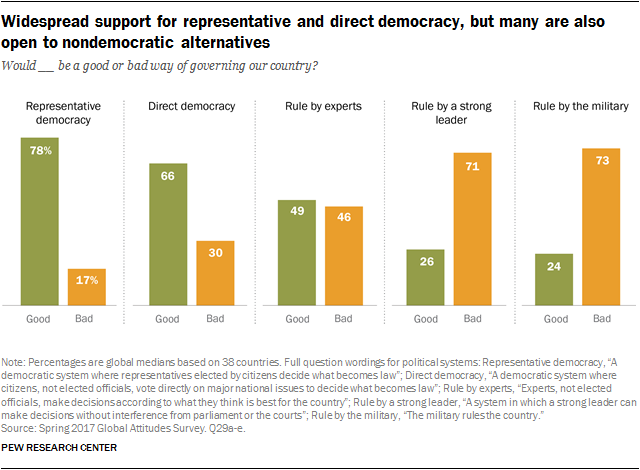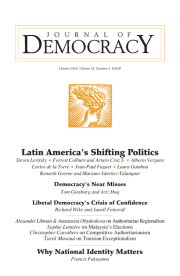 Liberal democracy is experiencing a crisis of confidence, according to the Pew Research Center’s Richard Wike and Janell Fetterolf. Scholars and pundits may disagree about the nature and depth of the problem, but few would argue that nothing is amiss. Progress toward democracy has been stalled or reversed in many emerging and developing nations, while several wealthy, supposedly “consolidated” democracies have experienced significant and unexpected setbacks, they write for the Journal of Democracy.*
Liberal democracy is experiencing a crisis of confidence, according to the Pew Research Center’s Richard Wike and Janell Fetterolf. Scholars and pundits may disagree about the nature and depth of the problem, but few would argue that nothing is amiss. Progress toward democracy has been stalled or reversed in many emerging and developing nations, while several wealthy, supposedly “consolidated” democracies have experienced significant and unexpected setbacks, they write for the Journal of Democracy.*
 People generally like representative democracy in theory (see above), but many are frustrated with it in practice. In surveys, many say that their vote does not give them an adequate voice in national politics, that elected officials do not care what people like them think, and that average citizens could do a better job than elected officials of dealing with their country’s problems, Wike and Fetterolf add:
People generally like representative democracy in theory (see above), but many are frustrated with it in practice. In surveys, many say that their vote does not give them an adequate voice in national politics, that elected officials do not care what people like them think, and that average citizens could do a better job than elected officials of dealing with their country’s problems, Wike and Fetterolf add:
Economic and cultural factors—not to mention advancing technology and geopolitical influences—may be contributing to the current backlash against democracy, but there may be more explicitly political causes at work as well. Although few average citizens seem to have given up on representative democracy or the fundamental rights and institutions of liberalism, their frustrations with how political systems are working are clear. These frustrations are manifesting themselves not only in support for new parties and leaders, but also in a willingness on the part of discontented citizens to consider other, sometimes less democratic approaches to governing.
Journal of Democracy Volume 29, Number 4 October 2018. National Endowment for Democracy and Johns Hopkins University Press.







